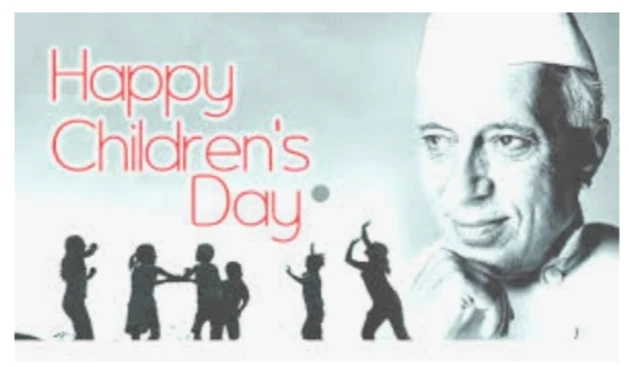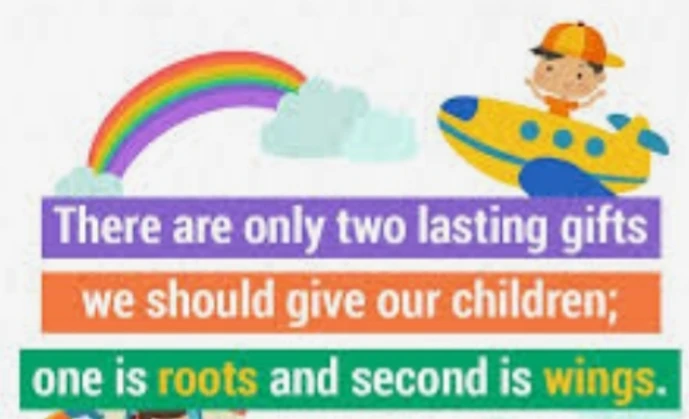Happy Children's Day
Children's Day is a commemorative date that is observed annually in remembrance of children whose observance dates differ by region. At the World Conference on Child Rights, International Children's Day was first declared in Geneva in 1925. In most Communist and post-Communist countries, it has been observed on 1 June since 1950. World Children's Day is celebrated on 20 November to commemorate the Declaration of the Rights of the Child by the UN General Assembly on 20 November 1959.

In order to raise awareness of children's rights, welfare and education, Children's Day is celebrated across India. It is celebrated annually on 14 November as a tribute to Jawaharlal Nehru, India's first prime minister. Fondly known among children as Chacha Nehru, he called for complete education for children. Children were seen by Nehru as the true strength of a nation and the cornerstone of society. On this day, and for adolescents, several educational and motivational programmes are held throughout India.

In India, the celebration of Children's Day goes back to 1956. On 14 November, India celebrates children's day. Children's Day in India is observed after the death of Jawaharlal Nehru. It was done because he was very influential as Chacha Nehru with the children, so a resolution was passed in parliament to give the first Prime Minister of India a fitting farewell.
Jawaharlal Nehru was an Indian independence leader and, eventually, India's first Prime Minister and, both before and after independence, a key figure in Indian politics. He emerged as a prominent leader of the Indian independence movement, serving from its formation in 1947 as an independent nation to his death in 1964 as India's prime minister. Due to his origins with the Kashmiri Pandit community, he was also known as Pandit Nehru. Nehru was a graduate of Trinity College, Cambridge and the Inner Temple, the son of Swarup Rani and Motilal Nehru, a famous lawyer and nationalist statesman, where he studied to be a barrister. He enrolled at the Allahabad High Court upon his return to India and took an interest in national politics, which gradually replaced his legal practise. A committed nationalist since his teenage years, during the upheavals of the 1910s, he became a growing figure in Indian politics. With the implicit approval of his mentor, Gandhi, he became the influential leader of the left-wing factions of the Indian National Congress during the 1920s, and eventually of the whole Congress. As President of Congress in 1929, Nehru called for full independence from the British Raj and instigated the decisive change of the Congress to the left. During the 1930s, Nehru and the Congress dominated Indian politics as the nation pushed towards independence. When the Congress won the provincial elections of 1937 and established the government in many provinces, his concept of a secular nation-state was evidently validated; on the other hand, the separatist Muslim League fared much poorer. However, in the wake of the Quit India Movement in 1942, which saw the British effectively crush the Congress as a political organisation, these gains were seriously undermined. Nehru, who had reluctantly listened to Gandhi's appeal for immediate independence because during World War II he decided to help the Allied war effort, came to a much altered political environment out of a long prison sentence. Under his old congressional colleague and now foe, Muhammad Ali Jinnah, the Muslim League had come to dominate Muslim politics in India. Negotiations for power-sharing between Congress and the Muslim League collapsed and gave way to India's independence and bloody partition in 1947. Nehru was chosen by Congress to take office as the first prime minister of independent India, although the issue of leadership was resolved as far back as 1941, when Gandhi recognised Nehru as his political heir and successor. He set out, as Prime Minister, to realise his vision of India. In 1950, India's Constitution was adopted, after which he embarked on an ambitious economic , social and political reform programme. In particular, he oversaw the transformation of India from a colony to a republic, thus promoting a plural, multi-party structure. He took a leading role in the Non-Aligned Movement in foreign policy while projecting India as a regional hegemon in South Asia. The Congress emerged as a catch-all party under the leadership of Nehru, dominating national and state-level politics and winning consecutive elections in 1951, 1957, and 1962. In spite of political troubles in his final years and a lack of leadership during the 1962 Sino-Indian War, he remained popular with the people of India. His birthday is celebrated in India as children's day.



Happy Children's Day
ReplyDeleteThank you
Delete